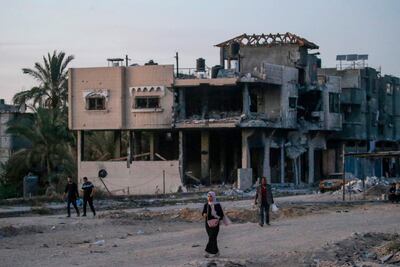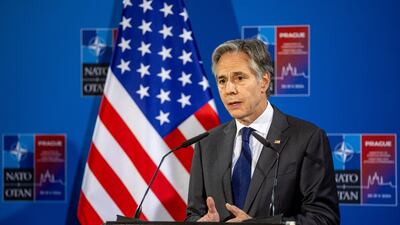Live updates: Follow the latest on Israel-Gaza
US Secretary of State Antony Blinken has discussed a three-phase Israeli proposal for a ceasefire in Gaza in a series of phone calls with his UAE, Saudi, Jordanian and Turkish counterparts.
Sheikh Abdullah bin Zayed, UAE Minister of Foreign Affairs, said the ceasefire deal announced by US President Joe Biden on Friday should be treated seriously and positively, Wam reported on Saturday.
In a phone call with Mr Blinken on Saturday, Saudi Foreign Minister Prince Faisal bin Farhan emphasised the kingdom’s support for immediate ceasefire efforts in Gaza, as well as a complete Israeli withdrawal from the strip.
Israel's proposal for a ceasefire, in return for the release of Israeli hostages, was announced by US President Joe Biden at the White House on Friday.
Jordan supports the efforts made by Egypt, Qatar and the US to reach an exchange deal as quickly as possible, Jordanian Foreign Minister Ayman Safadi told Mr Blinken.
“Jordan stresses the need to deal seriously with every proposal that achieves a permanent ceasefire, ends the suffering of the Palestinian people in Gaza, and ensures the return of the displaced to their areas and the withdrawal of the Israeli occupation forces from Gaza,” Mr Safadi said after the call.
Speaking to Turkish Foreign Minister Hakan Fidan, Mr Blinken “emphasised that Hamas should accept the deal and that every country with a relationship with Hamas should press it to do so without delay”, the US State Department said.
The first phase of the proposal involves a six-week ceasefire when Israeli forces would withdraw from “all populated areas” of Gaza, some hostages – including the elderly and women – would be freed in exchange for hundreds of Palestinian prisoners, Palestinian civilians could return to their homes in Gaza and 600 lorries a day would take humanitarian aid into the enclave.
The three-phased ceasefire would begin with Hamas and Israel negotiating a permanent ceasefire that Mr Biden said would last “as long has Hamas lives up to its commitments”.
If negotiations took more than six weeks, the temporary ceasefire would extend while they continued.
In the second phase, Mr Biden said there would be an exchange for all remaining living hostages, including male soldiers, Israeli forces would withdraw from Gaza and the permanent ceasefire would begin.

The third phase would include a major reconstruction plan for Gaza and the return of the “final remains” of hostages to their families.
“It's time for this war to end and for the day after to begin,” said Mr Biden, who is under election-year pressure to stop the Gaza conflict, now in its eighth month.
Hamas, which Mr Biden said received the proposal from Qatar, released a statement reacting positively.
The Palestinian group which controls the Gaza Strip said it was ready to “deal positively and constructively” with any proposal which was based on a permanent ceasefire in addition to the “complete withdrawal from the Gaza Strip, reconstruction, the return of the displaced to all their places of residence, and the completion of a serious prisoner exchange deal if the occupation declares its explicit commitment to that.”
Prime Minister Benjamin Netanyahu, however, on Saturday insisted on Hamas's destruction as part of the Israeli plan to end the war.
“Israel's conditions for ending the war have not changed,” Mr Netanyahu said on Saturday.
“The destruction of Hamas's military and governing capabilities, the freeing of all hostages and ensuring that Gaza no longer poses a threat to Israel,” he stated.
Israel's opposition leader on Saturday urged Mr Netanyahu to heed the call for a Gaza truce.
“The government of Israel cannot ignore President Biden's consequential speech. There is a deal on the table and it should made,” Yair Lapid said in a post on X. “I remind Netanyahu that he has a safety net from us for a hostage-release deal if [Itamar] Ben-Gvir and [Bezalel] Smotrich leave the government.”
The ceasefire proposal comes as Israel's assault on Rafah, in southern Gaza, has sparked global outcry.
Egypt is set to host a meeting with Israel and the US on Sunday to discuss the reopening of the Rafah crossing, a key gateway of much-needed aid supplies, Egyptian media reported.

Gaza residents react to proposal
Residents in Gaza told The National they welcomed the plan and urged the international community to immediately work towards making the ceasefire proposal a reality. Some said the proposal is an indication of how difficult the war in Gaza has become for the Israeli military.
“The declaration aims to save Israel from defeat, which has already occurred,” Azmi Ahmad, 45, told The National.
“All we want now is for the war to end. Of course, we had hoped for a ceasefire earlier to save lives, but we hope it happens now because we are truly fed up.”
Ola Aboud, who now resides in Mawasi in western Rafah after fleeing central Gaza, said she believes that Mr Netanyahu can no longer reject the ceasefire as Mr Biden announced publicly.
“He does not want to appear intransigent in front of the families of the hostages,” she said.
“He will prolong the negotiations and employ evasive tactics to appease his allies in the far-right, while at the same time, he will have agreed to Biden's proposal to enter negotiations.”
Jihad Mohsen, 35, who now lives in Deir Al Balah in the centre of the Gaza Strip, told The National he is less optimistic.
“It is clear that this is an Israeli proposal presented by Biden. They believe that Hamas will reject it, bringing negotiations back to square one,” he said.
“We want the war to end, but at the same time, we don’t want our sacrifices to be in vain. Gaza has been set back 100 years. We want an honourable deal, reconstruction, and a return to our normal lives.”

